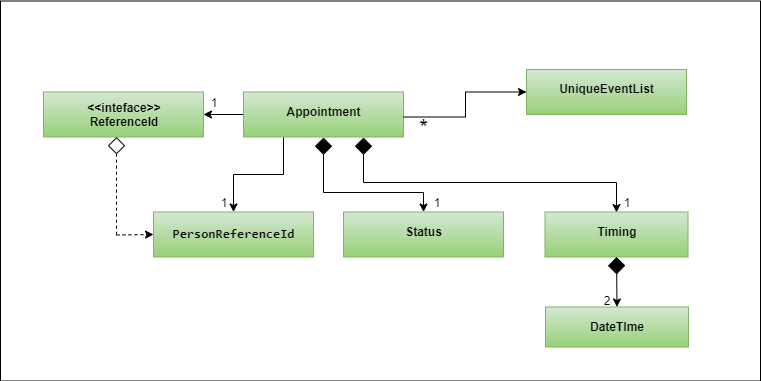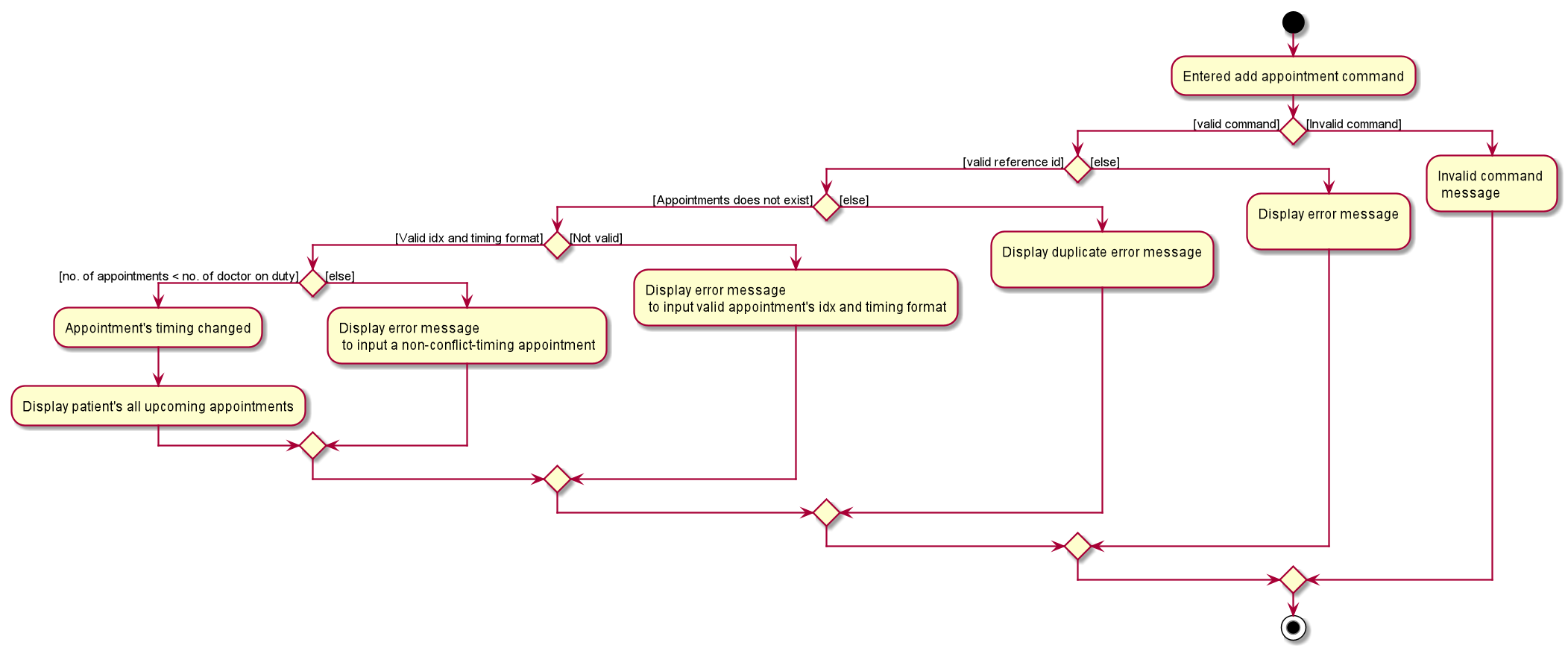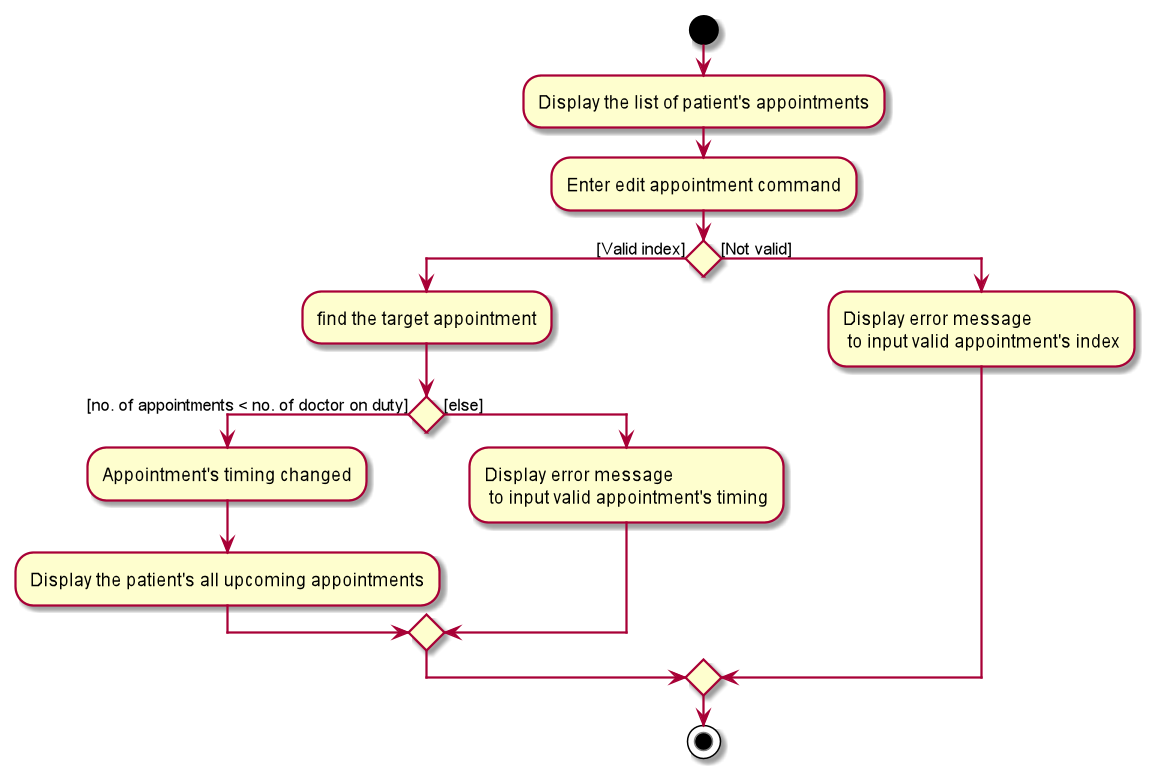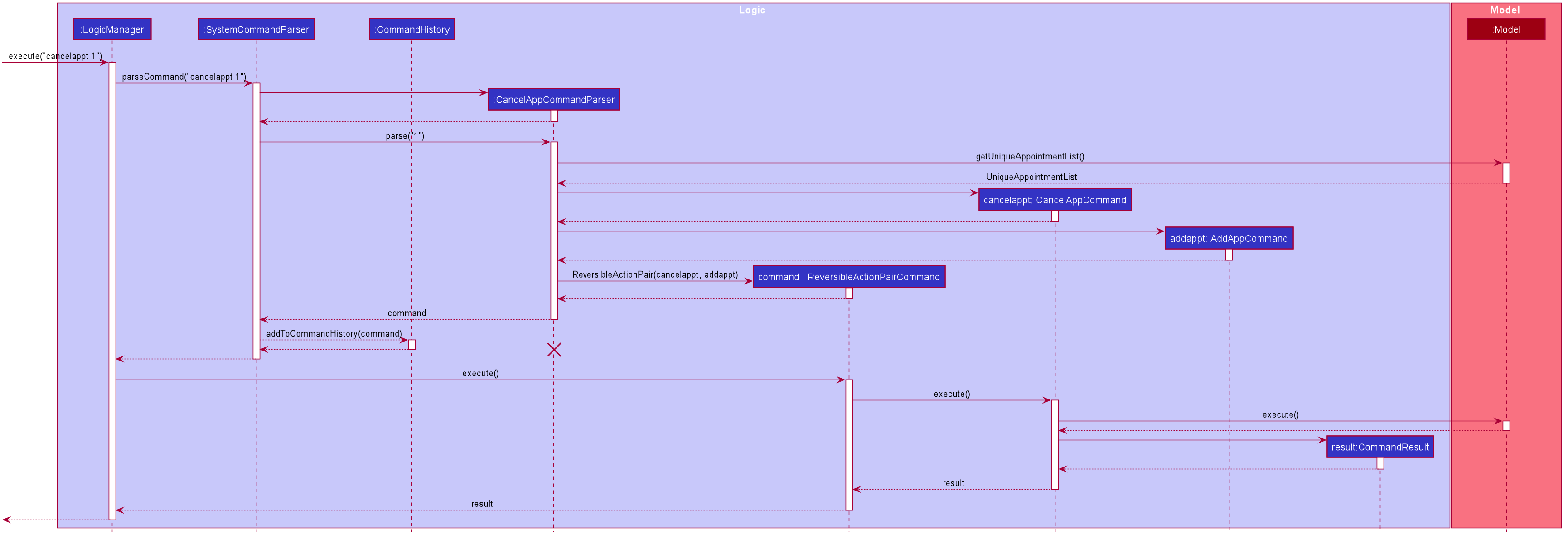Overview
ClerkPro is a desktop application used for managing clinic’s appointments, queue and scheduling. The user interacts with it using a CLI, and it has a GUI created with JavaFX. It is written in Java, and has about 10 kLoC.
Summary of contributions
This section’s purpose is to summarise my contributions for the duration of this project. For more details about the contributions, click the link to the corresponding pull request.
-
Major enhancement 1: added Appointment Management feature
-
What it does: The Appointment feature enables users to manage appointments for patients by providing basic Create, Read, Update, Delete (CRUD) of appointments. User is also able to find missed appointments and settle each missed appointment efficiently.
-
Justification: This feature greatly improves the product as it meets the necessary demands a receptionist faces on a day-to-day basis, i.e. Add appointments.
-
Highlights: Appointments, in reality, rely heavily on different components such as patients and onduty doctors to be booked. The challenge in implementing this feature was checking appointments time with doctors' duty shifts. It requires an in-depth understanding of clerkPro’s architecture.
-
-
Major enhancement 2: added Duty Shift Schedule feature
-
What it does: The duty shift scheduling provides users the ability to schedule duty shifts for doctors. It can help doctors to check, add, cancel and edit duty shifts efficiently.
-
Justification: This feature is important as the user would need to schedule duty shift for doctor. i.e. change duty shift.
-
-
Code contributed
-
The following link contains all the code contributed throughout the entire project: Functional code and Test code
-
-
Other contributions:
-
Community:
-
Contributed to forum discussions (example: 1]
-
Reported bugs and suggestions. i.e. I mentioned that user should not edit or delete data file in UG.
-
-
Documentation:
-
Database:
-
Edited pre-load database(Pull request #139)
-
-
Enhancements to existing features:
-
Wrote additional tests for existing features to increase coverage from 66.25% to 71.55% (Pull requests #112)
-
-
Contributions to the User Guide
Given below are sections I contributed to the User Guide. They showcase my ability to write documentation targeting end-users. |
Appointment Management
Before you process any commands in appointment management, please ensure you have a patient with referenceid of E0000001A by using patient E0000001A.You can refer to newpatient command to register this patient if the patient is not registered.
|
Displays appointments: appointments
Displays a sorted list of upcoming appointments for the patient that is associated to the given REFERENCE_ID.
If no keyword is given, all upcoming appointments will be displayed.
Format: appointments [<REFERENCE_ID>]
Schedules an appointment: newappt
Schedules a new appointments for a patient.
|
The appointment(s) will be rejected by the system, if there are insufficient staff doctors on duty at the time of the appointment. e.g. Cannot schedule more appointments than available doctors on duty. |
If both -reoccur <INTERVALS> and -num <REOCCURRING_TIMES> fields are present, appointments of these <REOCCURRING_TIMES> will be added to the patient
appointment schedule in <INTERVALS>. Otherwise, only one event will be added.
If the optional field [-end <END_TIMING>] is absent, default end time is 30 mins after start time of the appointment. Otherwise, end time will be [-end <END_TIMING>].
The optional field [-reoccur <INTERVALS>] can be -reoccur w, -reoccur m, or -reoccur y.They represent to add weekly, monthly, yearly repeat appointment respectively.
Format: newappt -id <PATIENT_REFERENCE_ID> -start <START_TIMING> [-end <END_TIMING>] [-reoccur <INTERVALS> -num <REOCCURRING_TIMES>]
Acknowledges a appointment: ackappt
Acknowledges the most upcoming appointment only if patient arrives on the same day and the arriving time is before the appointment’s end time.
Format: ackappt <REFERENCE_ID>
Cancels an appointment: cancelappt
Cancels the specified appointment.
To avoid accidental cancellation of another patient’s appointments, the user must first narrow down the search to a single patient by using the appointments [<REFERENCE_ID>] command. |
Format: cancelappt <ENTRY_ID>
Changes the appointment date: editappt
Changes the timing for an existing appointment.
If optional field [-end <END_TIMING>] is not present, default endTiming is 30 mins after startTiming. Otherwise new endTiming will be [-end <END_TIMING>].
To avoid accidental rescheduling of another patient’s appointments, the user must first narrow down the search to a single patient using the appointments [<REFERENCE_ID>] command. |
|
The operation is rejected if there are insufficient staff doctors on duty at the time of the new appointment. |
Format: editappt -entry <ENTRY_ID> -start <START_TIMING> [-end <END_TIMING>]
Lists patients who have missed their appointments: missappt
Lists all appointments that are missed.
| An appointment is considered missed if the appointment was not acknowledged and the current time has passed the appointment’s end time. |
Format: missappt
Sets missed appointments as settled/notified: settleappt
Settles and removes the missed appointment based on the given index.
Settling refers to the user following up on contacting the patient who has missed his/her appointment.
Only missed appointments can be settled. The user must first display the missed appointment listing by using missappt, before using this command. |
Format: settleappt <ENTRY_ID>
Shows the empty slots: slot (v2.0)
List all the available empty slots for patients to make appointments
Format: slot -start <START_DATE>
Duty-shift Management
Before you process any commands in Duty-shift Management, please ensure you have a doctor with referenceId of W0000001A by using doctor W0000001A.You can refer to newdoctor command to register this doctor if the doctor is not registered.
|
Displays duty shifts: shifts
Displays a sorted list of upcoming duty shifts for the staff doctors that is associated to the given REFERENCE_ID.
If no keyword is given, all upcoming shifts will be displayed.
Format: shifts [<REFERENCE_ID>]
Adds a duty shift for a doctor: newshift
If both -reoccur <INTERVALS> and -num <REOCCURRING_TIMES> fields are present, duty shifts of these <REOCCURRING_TIMES> will be added to the doctor duty roster in <INTERVALS>.
Otherwise, only one shift will be added.
Format: newshift -id <STAFF_REFERENCE_ID> -start <START_TIMING> -end <END_TIMING> [-reoccur INTERVALS -num REOCCURRING_TIMES]
Contributions to the Developer Guide
Given below are sections I contributed to the Developer Guide. They showcase my ability to write technical documentation and the technical depth of my contributions to the project. |
Appointment Feature
The Appointment feature enables users to manage appointments for patients by providing basic Create, Read, Update, Delete (CRUD) of appointments. User is also able to find missed appointments and settle each missed appointment efficiently.
The number of scheduled appointments cannot be more than the number of on-duty staff doctors at any given time.
Current Implementation
The current appointment feature is implemented using a list which works like a balanced binary search tree. This allows us to search for an appointment within O(logn) instead of O(n) time, where n is the number of appointments in the list.
The Appointment feature contains multiple operations to indirectly manipulate the UniqueEventList. The implemented operations include:
newappt Command - Creates an new appointment or reoccurring appointments for a patient.
ackappt Command - Acknowledges an appointment whenever the patient checks in with the clerk.
appointments Command - Lists all upcoming appointments or appointments which involves the patient whose referenceId contains a certain keyword.
editappt Command - Edits an appointment timing.
cancelappt Command - Cancels an appointment.
missappt Command - Lists all missed appointments.
settleappt Command - Removes a missed appointment.
The appointment class diagram below illustrates the interactions between the Appointment class and associated classes.

The appointment will be rejected by the system, if there are insufficient staff doctors on duty at the time of the appointment.
Each Appointment object consists of a PersonReferenceId, Timing, Status. Timing class has 2 DateTime objects which indicates the start and end time of the appointment. The UniqueEventList contains 0 or more appointments.
The current implementation of Appointment checks with patient object by the unique referenceId and also checks the timing with doctors' dutyRoster. If the referenceId exists within the Model#UniquePersonList and the timing is valid, then the Appointment object is constructed. This ensures that the patient is registered before making any appointments and the appointment’s timing is valid.
The appointment will be rejected by the system, if there are insufficient staff doctors on duty at the time of the appointment.
Before an appointment can be scheduled, the system first checks the total number of staff doctors on duty in that timeslot. Next, the system checks the existing appointments in that timeslot. If the number of appointments in that timeslot is less than the number of doctors, the appointment will be scheduled. Otherwise, the appointment will not be scheduled.
newappt Command
The newappt command is similar to the new command of patient and doctor. The command takes in the parameters required to construct ReferenceId, DateTime and Status. The image below shows how the Appointment object is constructed.
The following activity diagram summarizes what happens when a user executes a newappt command:

newappt commandackappt command
The ackappt command marks the patient’s the most upcoming appointment as acknowledged only if it is on the same day and it is before the appointment’s end time and also updates UniqueEventList to display the rest appointments belonging to the patient.
appointments Command
The appointments command works in two different ways.
Case 1: appointments referenceId
The appointments command searches for appointments that belong to the patient based on the given referenceId. The filtered appointments are found in ModelManager. The list is instantiated by filtering the UniqueEventList using EventContainsKeywordPredicate which is created from the ReferenceId argument supplied by the user.
Case 2: appointments
If the appointments command is executed without any other arguments, it executes with the predicate EventContainsApprovedStatusPredicate. updateFilteredAppointmentList() is called and the entire list of upcoming appointments is shown to the user.
editappt Command
The following activity diagram summarizes what happens when a user executes a editappt command:

editappt commandcancelappt Command
cancelappt simply takes in the index of the target appointment to cancel according to the displayed appointment list.
Given below is the sequence diagram for interactions within the Logic component for the execute("cancelappt 1") API call.

cancelappt 1 CommandDesign Considerations
Aspect: How to store Timing fields
-
Alternative 1 (current choice): Create
DateTimeandTimingclass to storePros
1. Makes it easier to calculate timings and clashes between multiple appointments with different timing field.
Cons
1. Requires additional code to implement Timing class and interact with other common methods that rely on DateTime.
-
Alternative 2: Store as Strings
Pros
1. Makes it easier to implement.
Cons
1. Requires additional code to convert into
DateTimeclass when carrying out calculating methods.
Aspect: display appointments
-
Alternative 1 (current choice): Display appointments in a tab
Pros
1. Creates an intuitive and easily navigable screen to display appointments.
Cons
1. Decreases the efficiency of CLI by having to use GUI inputs.
-
Alternative 2: Keeps the onscreen clutter at a minimum and stays in line with the CLI concept.
Pros
1. Makes it easier to implement.
Cons
1. Increases difficulty in freely accessing appointments.
Duty Shift Scheduling
The duty shift scheduling provides users the ability to schedule duty shifts for doctors. It can help doctors to check, add, edit duty shifts efficiently.
Current Implementation
The duty shift scheduling contains multiple operations to indirectly manipulate the UniqueEventList. The implemented operations include:
newshift Command - Adds a duty shift or reoccurring duty shifts to a doctor.
shifts Command - Lists all duty shifts involving the doctor’s referenceId which contains the keyword.
editshift Command - Change a current duty shift’s timing.
cancelshift Command - Cancels duty shift.
Each Duty Shift is an Event object consists of a PersonReferenceId, Timing, Status. Timing class has 2 DateTime object as they indicate the start and end times of the duty shift.
The current implementation of duty shift checks with doctor object by the unique referenceId and also checks the timing with appointments. If the referenceId exists within the Model#UniquePersonList and the timing is valid, then the duty shift is constructed. This ensures that the doctor is registered and the duty shift’s timing is valid before making any duty shifts.
The duty shift will be rejected by the system, if there are insufficient staff doctors on duty at the given time.
Before a duty shift’s time can be edited, the system first checks the total number of staff doctors on duty in that timeslot. Next, the system checks the existing appointments in that timeslot. If the number of appointments in that timeslot is less than the number of doctors, the duty shift’s time will be changed. Otherwise, the duty shift will not be allowed to edit.
newshift Command
The newshift command behaves similarly to the new command used for patient and doctor. The command takes in the parameters required to construct ReferenceId, DateTime and Status.
shifts Command
The shifts command works in two different ways.
Case 1: shifts ReferenceId
The shifts command searches for duty shifts that belong to the doctor based on the given ReferenceId. The filtered shifts are found in ModelManager. The list is instantiated by filtering the UniqueEventList using EventContainsKeywordPredicate which is created from the referenceId argument supplied by the user.
Case 2: shifts
The shifts command behaves similarly to shifts ReferenceId when it does not take in any other arguments. Instead, it automatically executes with the predicate EventContainsApprovedStatusPredicate. updateFilteredEventList() is called and the entire list of the upcoming duty shifts is shown to the user.